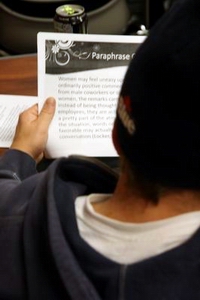Promoting Integrity at the Classroom Level:
Educate Students
Individuals are more likely to act with integrity if students are educated about what constitutes academic honesty and academic dishonesty. In a study of high school students, Donald L. McCabe (1999) found that "Most of the students said that there is little discussion and cheating at their schools. Cheating is mentioned only occasionally; for example, at school orientation or during the first day of class."
McCabe also found that "Although some schools publish their policies on cheating in a student handbook, many students felt that such guidelines have little impact on cheating."
As college faculty members, we cannot assume that students entering our classes know what constitutes cheating. And we cannot believe that Schoolcraft College's strongly worded policy on cheating will have any impact on cheating. Instead, we must teach students how to behave ethically in our disciplines. "Most students want to be honest; dishonesty is not innate; it is learned. Preemptive instruction, role modeling, and rewards must precede the learning of cheating."ť (Petress, 2003)
Best Practices
- Combating Internet Ignorance
- Require a Handbook
- Hold Class Discussions
- Develop Grading Rubrics
- Plagiarize Proof Specific Assignments
- Design Re-education Campaigns
- Refer to Tutors
- Refer Students to LAC
- Help Students Become Scholars
For Students
Some of the rules of academic integrity are very straightforward and clear. An example of this type of rule is that you need to place quotation marks around text that you take word for word from another author. Others are more complex. Still others require an understanding of copyright law. There are many quality on-line resources that promote academic integrity which have been compiled as part of Resources for Researchers:
